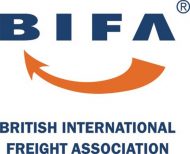2016 was another busy year for the trade association that represents UK freight forwarders and 2017 looks to be no different.

Having started 2016 with another extremely successful Freight Service Awards ceremony in London in late January, the British International Freight Association (BIFA) – continued to strengthen its executive team and welcomed long-time industry professional Carl Hobbis as BIFA Training Development Manager to head up the trade association’s training and industry education functions.
The year saw BIFA further promote the wide range of courses it provides as a training services provider, across all freight modes.
On two key issues that would affect its members in 2016, BIFA continued to work with HMRC to ensure a smooth transition for its members prior to the entry into force of the Union Customs Code.
On the contentious issue of container weighing, BIFA continued to work with the Maritime and Coastguard Agency to discuss the issues.
Following the end of the three-month settling-in period suggested by the IMO to its Member States in which competent authorities were urged to adopt a ‘practical and pragmatic’ approach to the enforcement of the SOLAS revision stipulating all packed containers have a verified gross mass (VGM) before being loaded aboard a ship, BIFA Director General Robert Keen, said: “Looking back at the first half of this year and the attention that we gave to the amendments to SOLAS, I was reminded of the so called Millennium Bug from 20 years ago.

“It was interesting to see that extremely high compliance rates had been achieved since the new VGM regulations came into force on July 1st 2016.”
Training, container weighing and the Union Customs Code was on the lips of everyone who visited BIFA’s stand at Multimodal 2016, where its representatives were on hand to chat to the 8,500 plus attendees at the event.
The year saw BIFA engaged in much lobbying with those in the corridors of power. Whilst the trade association made it clear to all in parliament that it is resolutely apolitical and favours no party in government, it wants all those in the corridors of power in Westminster to ensure that those involved in the facilitation of international trade are at the forefront of government thinking and policy.
Hence, there were strong words of criticism from BIFA over the ongoing delay to a decision on the expansion of UK aviation capacity. On the subject of Brexit, which is likely to dominate the agenda in 2017, BIFA declined to add to the highly speculative debate on what might happen to trade between the EU and the UK after the eventual completion of the latter’s exit from the former.
“Is there any worth in speculating on the consequences of Brexit before anything tangible has happened and there is little sign of any clear information emerging from Government on the timetable for exit?” said Keen at the time. One issue that had a significant impact on the work of BIFA members that may be off the agenda in 2017, are the dreadful events at the Channel Tunnel. BIFA repeatedly called for action to address the problems being caused by the would-be illegal immigrants attempting to stowaway on trucks. For the last six months of the year, the trade association pressed the authorities in France and the UK to step up their protection of the routes across the Channel and fulfil their obligations to let trade move unhindered before serious damage is done to this strategic freight route.
Other than focusing on the issues associated with Brexit, BIFA has a number of key objectives in the coming year, including a continuation of the work it has been undertaking on making more comprehensive educational material available to BIFA Members online. BIFA has wrestled with this topic for the past few years and believes it has an emerging strategy which will become clear as 2016 goes on.
Date established:
BIFA’s origins go back to the 1940s, but it was established in its current guise in 1988.
Membership number:
1,500 corporate members
Aims and objectives:
BIFA represents over 1500 UK companies in the logistics and supply chain management sector.
A not-for-profit organisation, BIFA is funded by subscription and run by its members for members. It operates with a full-time Secretariat which administers and manages the Association’s affairs.
BIFA members adopt a code of conduct, and trade under a nationally accepted set of Standard Trading Conditions that are backed in the insurance sector.
The association provides:
• representation
• information and guidance on technical matters
• training and development
• industry promotion
BIFA Main events 2017:
BIFA FREIGHT SERVICE AWARDS 2016 – 19th January 2017
Membership enquiry details:
Spencer Stevenson – Member Services Manager
BIFA
020 8844 3634




Comments are closed.